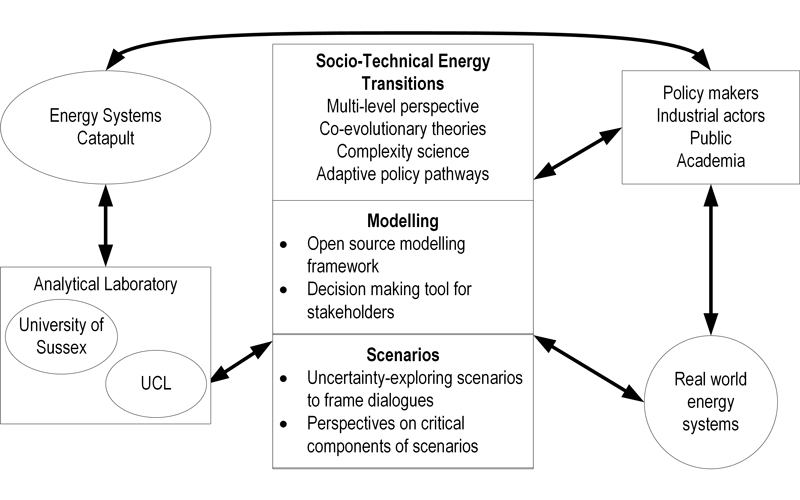O-STET
A collaborative research initiative aiming to bring socio-technical energy transition (STET) ideas into use within real world decision-making in the UK.

1 November 2018
Project overview
O-STET (Operationalising Socio-technical Energy Transitions) is a collaborative research initiative that brings socio-technical energy transition (STET) ideas into use within real world decision making on energy transition.
STET analysis combines long-term frameworks, qualitative scenarios and quantitative modelling elements, to improve understanding of how socio-technical change happens across the whole energy system. The project has responded to calls to provide more tractable and actionable insights from the STET approach, to inform real-world decision making about energy transition.
The O-STET project is a collaboration between researchers at UCL and the University of Sussex. At UCL there is a systems modelling team with a long track record in STET modelling, and at Sussex are experts in sustainability transitions from the Science Policy Research Unit. The main non-academic partner is the Energy Systems Catapult. Ongoing collaboration between these three teams ensures a broad and applicable set of outcomes are achieved through the project. A series of workshops has informed the research, along with a dissemination meetings with government.
- Funding and duration
Project Duration
Two years, five months (November 2018 to April 2021)
Sponsor
- Outputs
O-STET outcomes include:
- A new STET model, called TEMPEST, that simulates the UK’s energy transition as a political, social, and technological process.
- A set of scenarios that indicate the socio-political feasibility of reaching national emissions reductions targets, under varying future conditions.
- Recommendations for improving he socio-political feasibility of the UK’s energy transition.
- A branching point analysis on alternative pathways for the decarbonisation of heat in the UK’s built environment.
- Conference presentations and academic papers
- Impact
O-STET insights and models will be provided open source for use by stakeholders, such as the Energy Systems Catapult and energy modellers from BEIS, and published on the UCL Energy Institute website. The outputs will complement existing energy transition modelling, informing policy making, the energy industry, researchers in energy, and third sector organisations.
- People
UCL team
- Neil Strachan (PI)
- Rachel Freeman (Senior Research Fellow)
- Brunilde Verrier (Research Fellow)
University of Sussex team
- Tim Foxon (Co-I)
- Katherine Lovell (Research Fellow)
 Close
Close

